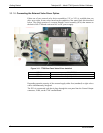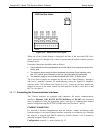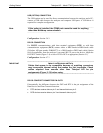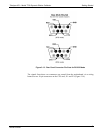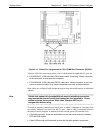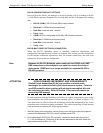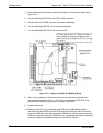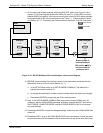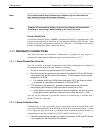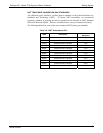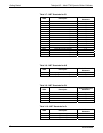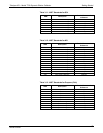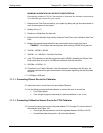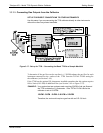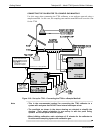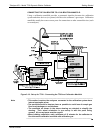
Getting Started Teledyne API – Model T700 Dynamic Dilution Calibrator
54
Note
The (communication) Host instrument can address only one instrument at a
time, each by its unique ID (see step 12 above).
Note
Teledyne API recommends setting up the first link, between the Host and the
first analyzer, and testing it before setting up the rest of the chain.
RS-485 CONNECTION
As delivered from the factory, COM2 is configured for RS-232 communications. This
port can be reconfigured for operation as a non-isolated, half-duplex RS-485 port. Using
COM2 for RS-485 communication disables the USB port. To reconfigure this port for
RS-485 communication, please contact the factory.
3.3.2. PNEUMATIC CONNECTIONS
Note that each time the pneumatic configuration is changed for any purpose, a
backpressure compensation calibration must be performed (Section 7.3.7).
3.3.2.1. About Diluent Gas (Zero Air)
Zero Air is similar in chemical composition to the Earth’s atmosphere but scrubbed of
all components that might affect the calibrator’s readings.
Diluent Air should be dry (approximately -20ºC of Dew Point).
Diluent Air should be supplied at a gas pressure of between 25 PSI and 35 PSI with
a flow greater than the flow rate for the calibrator. For the standard unit this means
greater than 10 SLPM.
For calibrator’s with the 20 LPM diluent flow option (OPT) the diluent air should
be supplied at a gas pressure of between 30 PSI and 35 PSI.
T700 calibrator’s with optional O
3
generators installed require that the zero air
source supply gas flowing at a continuous rate of at least 100 cm
3
/min.
If the calibrator is also equipped with an internal photometer, the zero air source
supply gas must be capable of a continuous rate of flow of at least 1.1 LPM.
Zero Air can be purchased in pressurized canisters or created using a Teledyne API’s
Model 701 Zero Air Generator.
3.3.2.2. About Calibration Gas
Calibration gas is a gas specifically mixed to match the chemical composition of the
type of gas being measured at near full scale of the desired measurement range. Usually
it is a single gas type mixed with N
2
although bottles containing multiple mixtures of
compatible gases are also available (e.g. H
2
S, O
2
and CO mixed with N
2
).
Calibration gas should be supplied at a pressure of between 25 PSI and 35 PSI with
a flow greater than the flow rate for the calibrator.
06873B DCN6388



